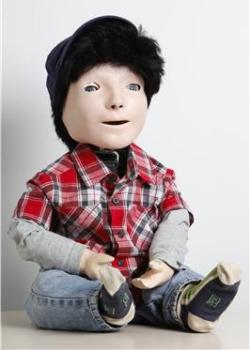Researchers at the University of Hertfordshire have developed a child-like robot, named KASPAR. KASPAR stands for Kinesics and Synchronisation in Personal Assistant Robotics; it was created to help children with autism. This project has been chosen as a key research project by ‘Big Ideas for the Future’ report.
 KASPAR robot
KASPAR robot
The report is a joint effort of the Universities UK and Research Councils.UK. Research projects from all universities in the UK in fields such as science, engineering, arts and humanities are evaluated by the report. The research team at Hertfordshire is led by Professor Kerstin Dautenhahn and their focus is on developing interactive humanoid robots, which would serve as therapeutic toys to children affected by autism.
KASPAR can be controlled and customized to suit the learning and development needs of a child. The robot plays the role of a mediator in helping children to communicate with people. Use of such robots in the therapy shows great potential of transforming the educational and social development of children with autism.
The report is part of the second annual Universities Week celebrations, which will be held from 13 to 19 June. Universities Week is celebrated in order to increase the awareness among public about the various role that universities in the UK play right from supporting economy to working with the local communities.